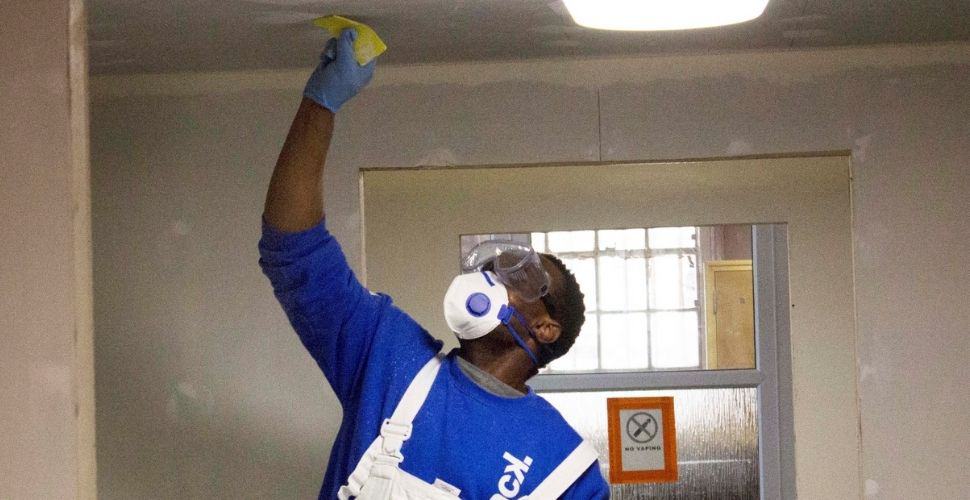Truthout reports the horrors of prison slavery and how incarcerated people continue to be exploited under the prison industrial complex.
Stephanie Foxworth was previously incarcerated at the Albion Correctional Facility in New York where she was forced to work, spending long days lifting sheets of metal. Her employer Corcraft, the New York State division of Correction Industries, uses incarcerated people for labor, paying them only 16–65 cents an hour.
Jobs include building desks, chairs, shelves and other items for institutions like the City University of New York (CUNY).
They are also assigned dangerous and unsanitary jobs such as removing asbestos, mold, and bird faeces for a bonus pay up to $1.30 per hour. These wages are not enough to even purchase items from the commissary.
“Foxworth said she never chose to work for Corcraft — rather, she was assigned to the job by the prison Program Committee. “I wanted out of Corcraft, period,” Foxworth said.”
“It was true slavery,” Foxworth said. “Slavery at its best.”
Corcraft’s primary customer is the Department of Corrections itself, meaning those incarcerated are in charge of creating items and cleaning the facility, essentially helping maintain where they are being held.
Orisanmi Burton, assistant professor of anthropology at American University, told Truthout:
“The primary purpose of prison labor programs like Corcraft is to save the state costs on prison operation and maintenance, so that the broader prison-industrial complex can continue to expand.”
Many of these work programs are covered under the “educational” programs, however many who are part of the program note that they are often coerced and forced into doing their tasks.
Sarah DiLallo worked for Corecraft and told Truthout:
“None of us signed up for it. We were all forced to do it,” DiLallo said. “They said to you, ‘The only way you’re leaving this program is if it’s in handcuffs.’”
The Department of Corrections representative said that an incarcerated person has a choice on what assignment they would like to do after their first 90 days. However, if they refuse work they are subject to disciplinary sanctions, including the loss of opportunities for a reduced sentence.
These types of working conditions and terms create a system where workers are being forced to work without free will, resulting in modern slavery.
As a result of the 13th Amendment exception, slavery remains legal as punishment for a crime according to the U.S. Constitution, contradicting international standards. This exception continues to impact incarcerated people, especially the Black and brown community. In the state of New York, Black people are incarcerated at a rate of eight times that of white people.
Corcraft heavily relies on the labor of incarcerated people to keep their business running. The low wages permit the company and the prison system to save money. If Corcraft paid average wages, the prison system’s operation cost would increase by 168 percent. The way the prison system is built creates a mechanism for the state to exploit workers without facing legal action.
“Prisons are an attempt to solve crises in our political economy. They neutralize millions of people who would otherwise be laborers,” Dr. Burton said. “Our political system is organized in such a way that the massive liquidation of huge amounts of people is required for capitalism to function properly.”
Securing full wages for those within the industrial prison complex will end the economic benefit of using inmates and immigrants by governments and private companies thereby helping reverse and ultimately end this system of forced labor or modern slavery.
That is why Freedom United is calling on all sectors to divest and cut contracts with abusive facilities and reform contracting so that prisoners and immigrant detainees are paid fair wages.
Join the campaign today and add your name to the call to end prison slavery in the U.S.







Freedom United is interested in hearing from our community and welcomes relevant, informed comments, advice, and insights that advance the conversation around our campaigns and advocacy. We value inclusivity and respect within our community. To be approved, your comments should be civil.
Are you kidding, lady? For 65 cents an hour? Wow. Yes, the committed a crime, and they have their freedom taken as punishment. But forced labor?
Jailbirds used to enjoy gang life and dopes in prison. My concern is for wrongly convicted. The rest of the population are horses and bodybuilders. Their strength and excess of energy fits for the useful purpose. Remember pimps, rapists, robbers, thieves, murderers, torturers, sadists, sex traffickers, gangsters, and the others like scammers and corrupted politicians all these convicts have earned their place in a joint. Working never will make them crying.
Did they think that going to jail was supposed to be like Spring break. They did a crime, why should they be laying around while the rest of us are out working.
This is the same in the UK!